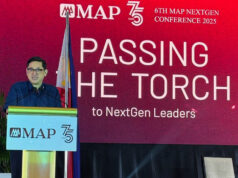By Victor V. Saulon,
Sub-Editor
THE Trade department along with foreign lending agencies called on big companies across the Association of Southeast Asian Nations (ASEAN) to create greater awareness about inclusive business practices and to build successful models to spur growth for micro, small and medium enterprises (MSMEs) in the region.
“We want to enjoin big companies to have an inclusive business plan,” Ramon M. Lopez, secretary of the Department of Trade and Industry (DTI), in a press conference on Wednesday on the sidelines of the ASEAN Inclusive Business Summit at the Marriott Hotel in Pasay City.
“Each one should have an inclusive business plan,” he added.
He said inclusive business (IB) plans make sure MSMEs become part of the value chain and create a more sustainable business model that goes beyond the temporary benefits brought by projects relating to corporate social responsibility.
He said for the part of the DTI, its investment promotion arm, the Board of Investments (BoI), has for the first time granted incentives to companies in tourism and agribusiness with inclusivity as part of their business plan.
Mr. Lopez was referring to Executive Order No. 22, which was signed in April 2017, extended the capital equipment incentive for qualified business enterprises registered with the BoI.
He said the BoI, which was designated to lay down the implementing rules and regulation of the order, had granted a five-year income tax holiday for such companies.
He said as the ASEAN chair for 2017, the Philippines is championing the promotion of inclusive business as a strategic measure to achieve inclusive, innovation-led growth.
“With the summit, being the very first high-level gathering in the region, we are confident that this event will be a strategic take-off point to further promote and advocate IB and deepen engagements with low-income communities and micro-entrepreneurs as business partners,” he said.
He said ASEAN region is in a strategic position for growth as its economy has been expanding, yet “over 300 million of our people across the region remain below subsistence levels.”
“Hence, the challenge we face today is more than just ensuring robust growth for the coming decades: it is ensuring that this growth is felt evenly across the region and within countries where inequality pervades,” he said.
He said when big businesses connect with MSMEs, they eliminate the middle man, leaving more revenue to those in the “lowest end of the pyramid.”
Eriko Ishikawa, the International Finance Corp.’s global head for inclusive business, said the World Bank arm has been focusing on the private sector of developing countries and has been investing $1 billion a year since 2005.
“We have [extended] $16 billion in financing to 500 companies with inclusive business models,” she said. “$2 billion of those investments went to ASEAN.”
She said the business models of these companies engage low-income people as suppliers or as consumers, “but we have to define it, we have to encourage them.”
Martin Lemoine, Asian Development Bank unit head for food and agribusiness investment, said the private sector can make a difference in creating sustainable jobs and providing relevant products and services to society.
“It has become an agent of positive social change, not only government,” he said.
Paolo F. Borromeo, Ayala Corp. managing director, said the conglomerate has been pursuing inclusive business models “for a long time.”
“Large enterprises have a very strong (and) unique role to play in inclusive development and nation-building,” he said. “Large businesses that operate in communities have moral and social responsibility towards developmental activities.”



